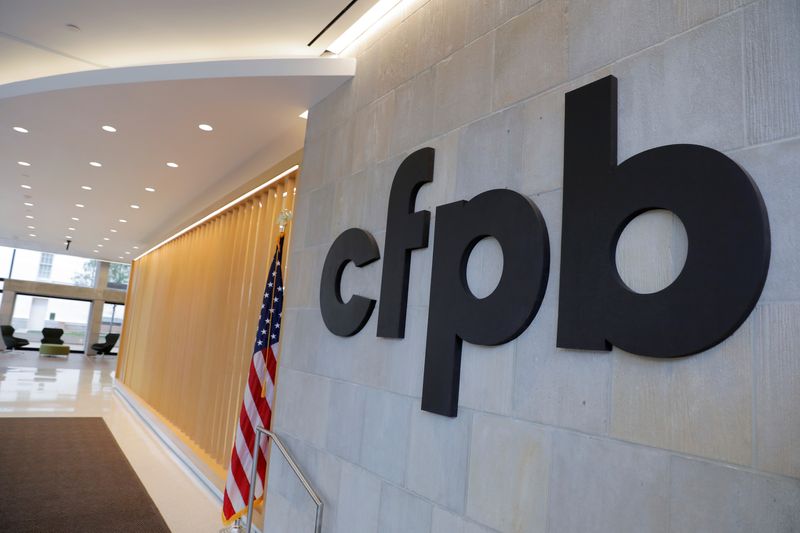By Katanga Johnson and Hannah Lang
(Reuters) - A long-awaited U.S. "open banking" rule that could dramatically boost consumer finance competition and increase Americans' access to financial services is being held up by privacy concerns, according to five people with knowledge of the matter.
The Consumer Financial Protection Bureau (CFPB) rule would allow consumers to easily share their financial data with third-parties. This would remove a key obstacle to switching service providers that might offer lower fees.
The White House in July 2021 urged the CFPB to get moving on an open banking rule as part of a broader competition push, while fintech companies and lawmakers are also pressing the agency to hurry up, according to two sources.
Such advocates say open banking will make it easier for non-banks like technology companies to compete with traditional financial institutions, lowering costs and boosting millions of Americans' access to financial services.
But the CFPB is grappling with how to handle consumer privacy and data protection issues created by the rule, the five sources said over the past month on condition of anonymity to discuss the nonpublic process.
CFPB Director Rohit Chopra's concerns focus in part on how Big Tech companies may use the data, given criticism that these companies have a record of exploiting personal consumer data to entrench their services, the people said.
The discussions on the rule had not previously been reported.
The CFPB director is trying to balance three issues, said Lisa Ledbetter, a partner at law firm Reed Smith who has been discussing the issues with bank and fintech clients.
These include how to scrutinize the influence of big tech in the marketplace, how to protect the security, privacy and effective consumer control over their data, and how to best advance competition, she said.
An agency source said the CFPB "feels the pinch" to propose the rule but is struggling to "strike the right balance."
Chopra, who as a Federal Trade Commission commissioner from 2018-2021 took a tough stance on Big Tech companies' data privacy practices, is also taking time to engage with all interested parties, four sources said.
"We are moving ahead with this rulemaking as a priority," a CFPB spokesperson said. "Protecting consumer privacy interests is an important factor in this rulemaking effort."
"Effective control by consumers over where their data flows and the purposes for which it is used is a vital component of a truly competitive landscape," the spokesperson said.
PANEL REVIEW
Open banking would unleash a slew of payment, investment, lending, financing and money-saving services and apps, fintechs said. For example, Americans could share all their bank account, debit and credit card transaction data with an app that could then provide tips on how to avoid a range of costly fees.
"Open banking means consumers pay less for better services. The CFPB should accelerate (the) rulemaking," said Penny Lee, chief executive officer of the Financial Technology Association.
While banks do not oppose the rule, they are pushing to limit its scope, arguing open banking could put consumers' data at risk because fintechs do not have the same rigorous cybersecurity and privacy standards as traditional firms.
Because it is expensive to maintain and protect customer data, banks are also reluctant to give it away for free, the five people said.
Europe, Britain and other countries already have open banking laws. The U.S. Congress mandated open banking after the 2009 financial crisis, but the CFPB only issued https://www.consumerfinance.gov/about-us/newsroom/consumer-financial-protection-bureau-releases-advance-notice-proposed-rulemaking-consumer-access-financial-records an 'advance notice of proposed rulemaking' seeking feedback on a potential rule in October 2020.
The next step in the process is a small business panel review, the people said. The CFPB will conduct the panel review "by year's end," the agency spokesperson said.
The Small Business Regulatory Enforcement Fairness Act requires the CFPB to seek feedback from a panel of small businesses about new regulations that may affect them.

Small banks, data aggregators and fintech companies are all lobbying to be on the panel and the agency is still figuring out who should have a seat at the table, five of the people said.
The panel has 60 days to submit a report to the CFPB, after which the agency can issue a draft rule.